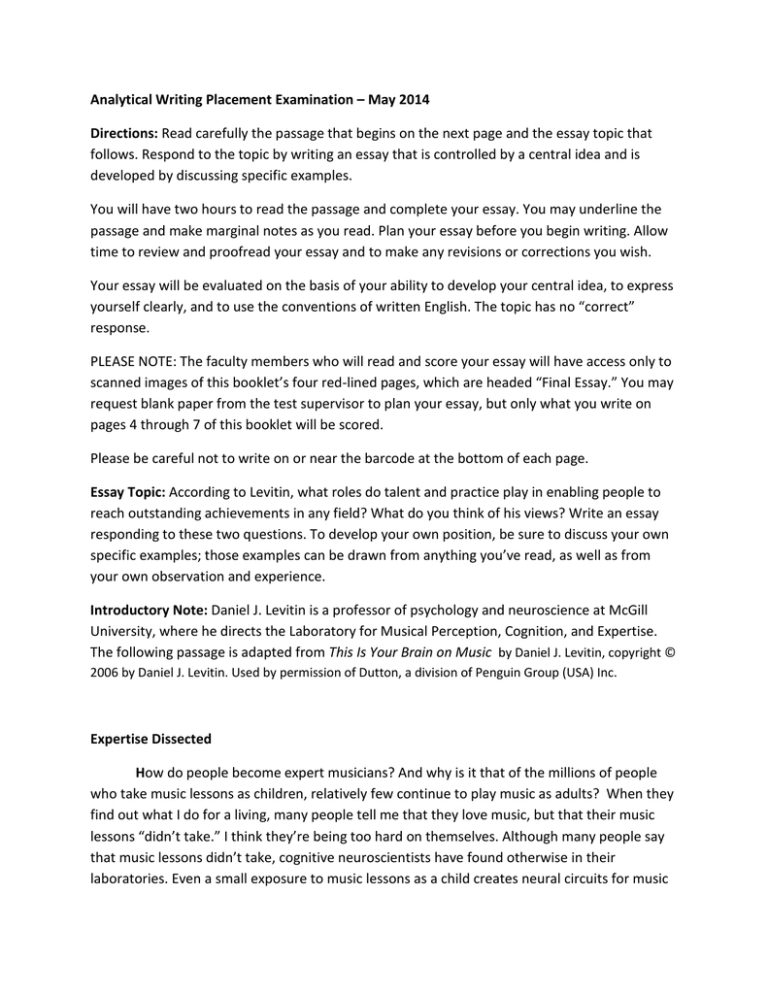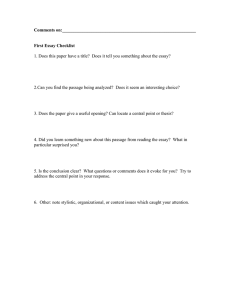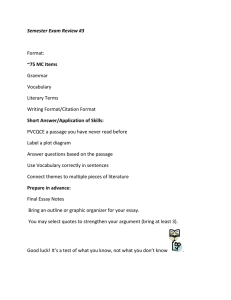
Analytical Writing Placement Examination – May 2014
Directions: Read carefully the passage that begins on the next page and the essay topic that
follows. Respond to the topic by writing an essay that is controlled by a central idea and is
developed by discussing specific examples.
You will have two hours to read the passage and complete your essay. You may underline the
passage and make marginal notes as you read. Plan your essay before you begin writing. Allow
time to review and proofread your essay and to make any revisions or corrections you wish.
Your essay will be evaluated on the basis of your ability to develop your central idea, to express
yourself clearly, and to use the conventions of written English. The topic has no “correct”
response.
PLEASE NOTE: The faculty members who will read and score your essay will have access only to
scanned images of this booklet’s four red-lined pages, which are headed “Final Essay.” You may
request blank paper from the test supervisor to plan your essay, but only what you write on
pages 4 through 7 of this booklet will be scored.
Please be careful not to write on or near the barcode at the bottom of each page.
Essay Topic: According to Levitin, what roles do talent and practice play in enabling people to
reach outstanding achievements in any field? What do you think of his views? Write an essay
responding to these two questions. To develop your own position, be sure to discuss your own
specific examples; those examples can be drawn from anything you’ve read, as well as from
your own observation and experience.
Introductory Note: Daniel J. Levitin is a professor of psychology and neuroscience at McGill
University, where he directs the Laboratory for Musical Perception, Cognition, and Expertise.
The following passage is adapted from This Is Your Brain on Music by Daniel J. Levitin, copyright ©
2006 by Daniel J. Levitin. Used by permission of Dutton, a division of Penguin Group (USA) Inc.
Expertise Dissected
How do people become expert musicians? And why is it that of the millions of people
who take music lessons as children, relatively few continue to play music as adults? When they
find out what I do for a living, many people tell me that they love music, but that their music
lessons “didn’t take.” I think they’re being too hard on themselves. Although many people say
that music lessons didn’t take, cognitive neuroscientists have found otherwise in their
laboratories. Even a small exposure to music lessons as a child creates neural circuits for music
processing that are more efficient than those of people who lack training. Music lessons teach
us to listen better, and they accelerate our ability to discern structure and form in music,
making it easier for us to tell what music we like and what we don’t like.
But what about those classes of people that we all acknowledge are true musical experts--the
Alfred Brendels, Sarah Changs, Wynton Marsalises, and Tori Amoses? How did they get what
most of us don’t have, an extraordinary facility to play and perform?
The scientific study of expertise has been a major topic within cognitive science for the past
thirty years, and musical expertise has tended to be studied within the context of general
expertise. In almost all cases, musical expertise has been defined as technical achievement-mastery of an instrument or of compositional skills. The late Michael Howe, and his
collaborators Jane Davidson and John Sloboda, launched an international debate when they
asked whether the popular notion of “talent” is scientifically defensible. They assumed the
following alternatives: either high levels of musical achievement are based on innate brain
structures (what people refer to as talent) or they are simply the result of training and practice.
They define talent as something (1) that originates in genetic structures and (2) that is
identifiable at an early stage by trained people who can recognize it even before exceptional
levels of performance have been acquired.
It is evident that some children acquire skills more rapidly than others: the ages of onset for
walking, talking, and toilet training vary widely from one child to another, even within the same
household. There may be genetic factors at work, but it is difficult to separate genetic factors
from factors with a presumably environmental component, such as motivation, personality, and
family dynamics. Similar factors can influence musical development and can mask the
contributions of genetics to musical ability. Brain studies, so far, haven’t been of much use in
sorting out the issue because it has been difficult to separate cause from effect. For example,
studies of violin players by Thomas Elbert have shown that the region of the brain responsible
for moving the left hand--the hand that requires the most precision in violin playing-- increases
in size as a result of practice. We do not know yet if the propensity for increase preexists in the
genetics of some people and not others.
The strongest evidence for the talent position is that some people simply acquire musical skills
more rapidly than others. The evidence against the talent position—or, rather, in favor of the
view that practice makes perfect--comes from research on how much training the experts or
high achievement people actually do. Like experts in mathematics, chess, or sports, experts in
music require lengthy periods of instruction and practice the most, sometimes twice as much as
those who weren’t judged as good.
In one study, students were secretly divided into two groups (not revealed to the students so as
not to bias them) based on teachers’ perceptions of their talent. Several years later, the
students who achieved the highest performance ratings were those who had practiced the
most, irrespective of which “talent” group they had been assigned to previously. This suggests
that practice is the cause of achievement, not merely something correlated with it. It further
suggests that talent is a label that we’re using in a circular fashion: when we say that someone
is talented, we think we mean that they have some innate predisposition to excel, but in the
end, we only apply the term retrospectively, after they have made significant achievements.
Anders Ericsson at Florida State University and his colleagues approach the topic of musical
expertise as a general problem in cognitive psychology involving how humans become experts
in general. In other words, he takes as a starting assumption that there are certain issues
involved in becoming an expert at anything, that we can learn about musical expertise by
studying expert writers, chess players, athletes, artists, mathematicians, in addition to
musicians.
The emerging picture from studies of high achievers in many fields is that ten thousand hours of
practice are required to achieve the level of mastery associated with being a world-class expert-in anything. In study after study--of composers, basketball players, fiction writers, ice skaters,
concert pianists, chess players, master criminals, and what have you--this number comes up
again and again. Ten thousand hours is equivalent to roughly three hours a day, or twenty
hours a week, of practice over ten years. Of course, this doesn’t address why some people
don’t seem to get anywhere when they practice, and why some people get more out of their
practice sessions than others. But no one has yet found a case in which true world-class
expertise was accomplished in less time. It seems that it takes the brain this long to assimilate
all that it needs to know to achieve true mastery.
[Copyright © 2014 by the University of California. All rights reserved. Produced for the
University of California.]


